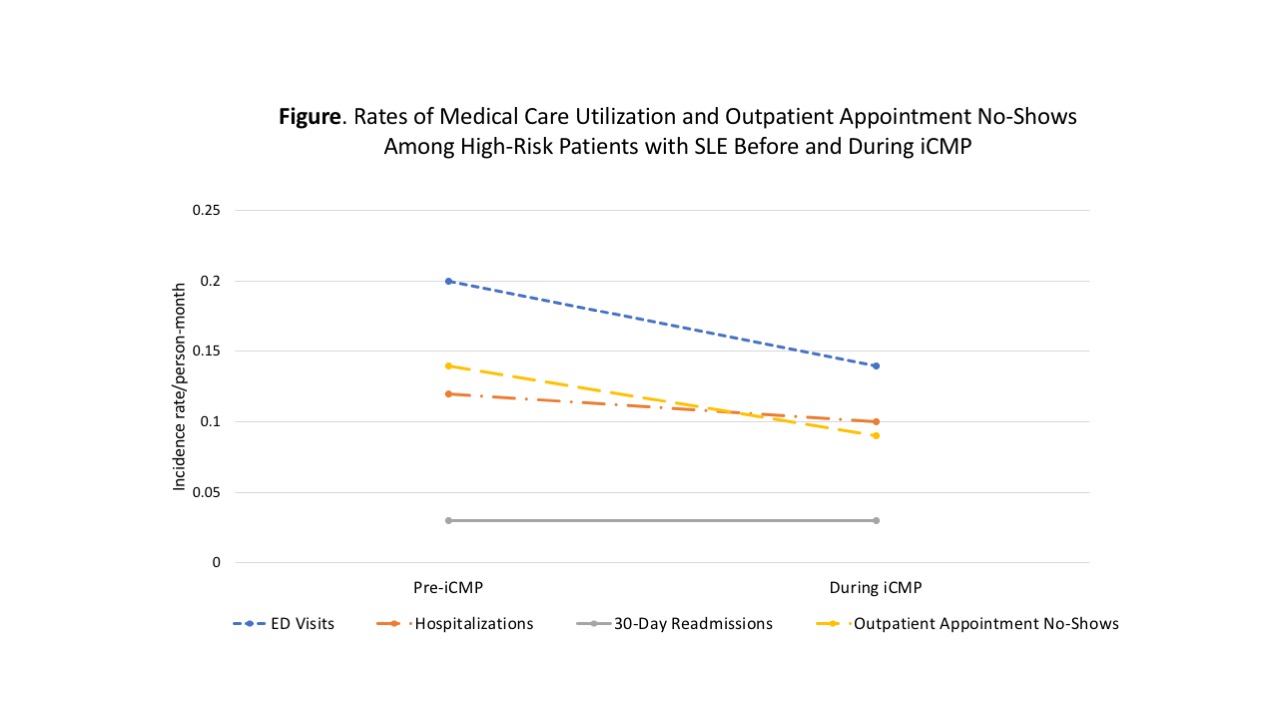Session Information
Session Type: Poster Session B
Session Time: 9:00AM-11:00AM
Background/Purpose: Patients with systemic lupus erythematosus (SLE) are often members of disadvantaged groups and some struggle with high acute care utilization and missed outpatient appointments. An integrated care management program (iCMP) was established at our multihospital system whereby nurses lead care coordination efforts for patients considered high risk for frequent emergency department (ED) visits and hospitalizations. We aimed to determine whether this program was effective at decreasing acute medical care use and outpatient no-show rates among patients with SLE.
Methods: The top two percent of medically and psychosocially complex patients within our multihospital system are enrolled in iCMP – a longitudinal primary care-embedded care management program. We used a validated electronic health record (EHR) machine learning algorithm (PPV 90%) to identify adults ≥18 with SLE enrolled in iCMP from January 2012-February 2019 and verified the diagnosis with EHR review. We used EHR data linked to insurance claims to compare the incidence rates of ED visits, hospitalizations, 30-day readmissions, and outpatient appointment no-shows during iCMP enrollment to the 12-months prior. We used Poisson regression to examine the incidence rate ratios (IRR) during versus pre-iCMP enrollment for each of these utilization measures, adjusting for age, sex, race/ethnicity, number of comorbidities and calendar year of entry, accounting for within-patient clustering.
Results: We identified 67 iCMP enrollees with SLE and linked EHR-claims data. Fifty-five met 1997 ACR criteria for SLE, 9 met 2012 SLICC criteria, and 3 did not meet criteria but were diagnosed and treated by a rheumatologist. The mean duration of iCMP enrollment was 46 (SD 29) months. The mean age was 60 (SD 17) years and 93% were female. Enrollees were 55% white, 25% black, 16% other race and 3% Asian, and 21% were Hispanic. Twenty patients had commercial insurance, 59 had Medicare, 4 had Medicaid and 16 had ≥1 one insurance. The rate of ED visits averaged 0.14/person-month during iCMP enrollment compared to 0.20/person-month pre-iCMP (IRR 0.66, 95% CI 0.48-0.92, p=0.01), the rate of hospitalizations averaged 0.10/person-month during iCMP compared to 0.12/person-month pre (IRR 0.89, 95% CI 0.64-1.24, p=0.5), and the rate of outpatient appointment no-shows was 0.09/person-month during iCMP compared to 0.14/person-month pre (IRR 0.74, 95% CI 0.57-0.97, p=0.03); see Figure. After adjusting for demographics, enrollment year, comorbidities, and repeated measures, there was a 37% reduction in the rate of ED visits during iCMP compared to the year prior (p=0.003) and trends towards reduced hospitalizations (IRR 0.88, 95% CI 0.65-1.19, p=0.39) and fewer missed appointments (IRR 0.80, 95% CI 0.62-1.04, p=0.097).
Conclusion: In a single arm, pre-post observational study, we found that a nurse-led, primary care-based integrated care management program appeared effective at decreasing the rate of ED visits for high-risk SLE patients and likely also reduced rates of missed appointments. Further studies are needed to determine the root causes of high utilization patterns for vulnerable patients and to develop strategies to comprehensively address these issues.
To cite this abstract in AMA style:
Williams J, Huang W, Collins J, Taber K, McLaughlin K, Cunningham R, Vogeli C, Wichmann L, Feldman C. The Impact of an Integrated Care Management Program on Acute Care Utilization and Outpatient Appointment Attendance Among High-Risk Patients with Lupus [abstract]. Arthritis Rheumatol. 2020; 72 (suppl 10). https://acrabstracts.org/abstract/the-impact-of-an-integrated-care-management-program-on-acute-care-utilization-and-outpatient-appointment-attendance-among-high-risk-patients-with-lupus/. Accessed .« Back to ACR Convergence 2020
ACR Meeting Abstracts - https://acrabstracts.org/abstract/the-impact-of-an-integrated-care-management-program-on-acute-care-utilization-and-outpatient-appointment-attendance-among-high-risk-patients-with-lupus/

